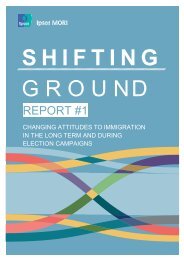You also want an ePaper? Increase the reach of your titles
YUMPU automatically turns print PDFs into web optimized ePapers that Google loves.
Over a quarter of respondents (26 percent) expressed a concern about the<br />
profession – which included the perception <strong>that</strong> a military career was not<br />
prestigious, or a dislike of the armed forces because of opposition to war, or the<br />
belief <strong>that</strong> the culture and training are too unwelcoming. Nonetheless, there is a<br />
potentially untapped market here. In 2010 the Equality and Human Rights<br />
Commission revealed <strong>that</strong>:<br />
and<br />
33% of Muslim women (of working-age) have no qualifications, and only 9% have a degree. 356<br />
Muslim men are also most likely not to have any qualifications (24%) and again, least likely<br />
to have a degree (<strong>11</strong>%). 357<br />
Between 2007 and 2009, Muslim men were also the least likely to be found<br />
working in managerial or professional or associate professional occupations (35<br />
percent). 358 Indeed, they are the most likely to fill low skilled jobs. 36 percent of<br />
Muslim men were involved in plant and machinery factory work and in unskilled<br />
elementary work. 359 In the study looking at Muslim attitudes towards the armed<br />
forces, it was this category of respondents – those working in manual and low<br />
skilled jobs – who expressed the greatest likelihood of considering a military<br />
career (79 percent). 360 Support for this option was similarly high among the<br />
unemployed (59 percent) – another problem particularly acute in segments of<br />
the British Muslim community. 361 There is consequently a real opportunity for the<br />
armed forces to advertise itself to this category, explaining the lifelong skills and<br />
qualifications which a career, for example, in the Royal Engineers, can bring. This<br />
can help to challenge the concerns they have about the profession while offering<br />
them a tangible and structured career path linked to more conventional<br />
qualifications.<br />
Fears of racism and discrimination<br />
Significantly, what mattered to Muslim men the most (24 percent) was the<br />
perception of racism and lack of opportunity for progression. This is a problem<br />
<strong>that</strong> has been exacerbated in recent years. The public debate following the<br />
Macpherson label of ‘institutional racism’ – though originally applied only to the<br />
police force – has caused a wider shift in the way minori<strong>ties</strong> perceive<br />
organisational cultures, including <strong>that</strong> of the armed forces. 362 This has been<br />
coupled with repeated media coverage of alleged bullying and racism within the<br />
armed forces – including embarrassing accusations <strong>that</strong> structures on Catterick<br />
garrison’s firing range resembled mosques. 363<br />
This problem has been compounded by the ‘War on Terror’ and British military<br />
campaigns in Afghanistan and Iraq – conflicts used by Islamists to suggest <strong>that</strong> the<br />
British Army is somehow engaged in a ‘War on Islam’. The MoD has been<br />
committed to creating a non-discriminatory culture for years. According to<br />
Humayun Ansari, in the 1990s ‘[t]he armed forces introduced measures to cater<br />
for Muslim needs, such as ration-packs <strong>that</strong> included halal food, and allowed<br />
Muslims to pray five times a day unless it was impossible for operational or<br />
Conclusion – Reviving Muslim Service in the Armed Forces<br />
356 How fair is Britain? Equality,<br />
Human Rights and Good Relations<br />
in 2010. The First Triennial Review<br />
(Equality and Human Rights<br />
Commission, 2010), p. 358<br />
357 Ibid.<br />
358 Ibid, p. 429.<br />
359 Ibid.<br />
360 Asifa Hussain and<br />
Mohammed Ishaq, British<br />
Pakistani Muslims’ Perceptions of<br />
the Armed Forces, Armed Forces<br />
and Society, Vol.28, No. 4,<br />
Summer 2002, p.607<br />
361 How fair is Britain? Equality,<br />
Human Rights and Good Relations<br />
in 2010. The First Triennial Review<br />
(Equality and Human Rights<br />
Commission, 2010), p. 405<br />
362 Sarah Neal, The Scarman<br />
Report, the Macpherson Report<br />
and the Media: How Newspapers<br />
Respond to Race-centred Social<br />
Policy Interventions, Journal of<br />
Social Policy (2003), Vol. 32, No.1,<br />
pp.55-74<br />
363 http://news.bbc.co.uk/1/hi/<br />
england/north_yorkshire/860965<br />
0.stm<br />
policyexchange.org.uk | 79



